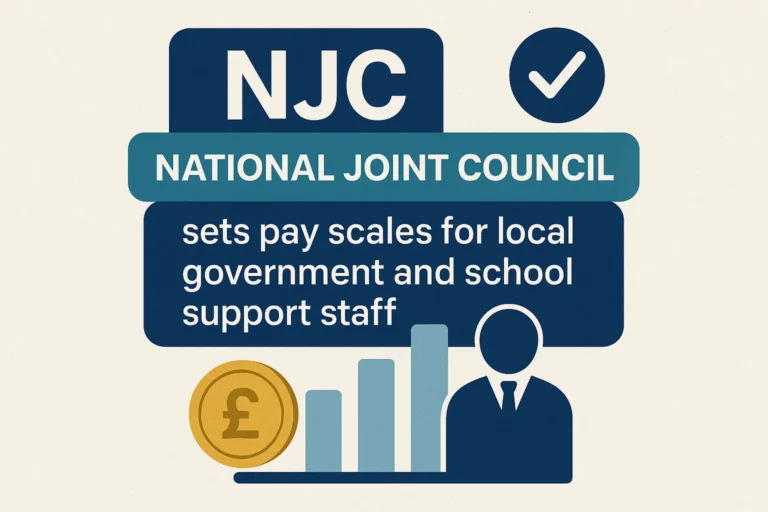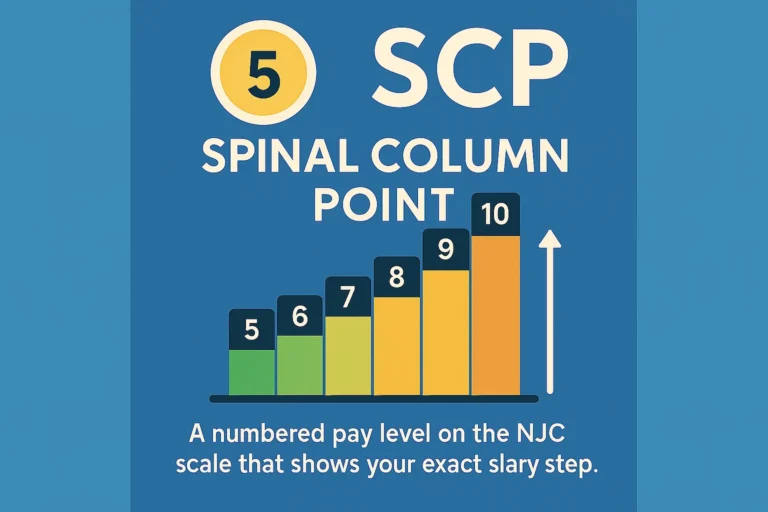No products in the cart.
So, how much do teaching assistants get paid in the UK? Most start at around £13 an hour outside London after the new NJC pay rise. If you’re more experienced or work as a Higher Level Teaching Assistant (HLTA), your pay can go up to £14–£16 or more. Those working in London usually earn a bit extra because of the higher cost of living.
However, there’s a catch. Most teaching assistants work on term-time contracts, which means your annual pay is pro-rata. In simple words, even though your hourly rate stays the same, your total yearly pay is lower because you don’t work during school holidays.
In this guide, we’ll walk you through everything that affects your pay — from hourly vs salary pay to London weighting, grades (Level 1–3 and HLTA), plus SEN and agency work. We’ll also share tips on how to check your exact rate using the Spinal Column Point (SCP) listed on your job advert.
By the end, you’ll know exactly what to expect and how to make the most of your TA salary.
What Is the Average Teaching Assistant Salary?

Let’s talk about what most teaching assistants actually earn in 2025. The teaching assistant’s salary is usually set by the NJC local government pay scale, which almost all schools follow. After the 2025/26 NJC pay rise of 3.2% from 1 April 2025, the numbers look a bit better this year.
If you’re starting out, you can expect a full-time salary of around £24,800 to £26,800 (FTE). As you move up the spinal points or take on more duties, your TA pay in 2025 will rise, too.
Remember, this is the full-time equivalent figure. Since most TAs work term-time only, your actual take-home pay will be lower than the FTE rate. Still, with the NJC uplift and fairer pay steps, it’s a solid time to work as a teaching assistant.
How Much Do Teaching Assistants Get Paid per Hour?

So, how much do teaching assistants earn per hour in 2025? Let’s break it down in a simple way. Most schools follow the local council pay tables, and these rates went up in April 2025.
Here’s a quick look at the typical hourly rates outside London:
- SCP 3: around £12.85 per hour (entry level)
- SCP 7: around £13.69 per hour (some experience)
- SCP 10: around £14.36 per hour (experienced TA)
- SCP 15: around £15.56 per hour (senior or HLTA roles)
These rates can vary slightly depending on your local council and school responsibilities.
However, remember:
- London schools usually pay more due to the higher cost of living.
- Always check the Spinal Column Point (SCP) in the job advert to know your exact rate.
For example, councils like Stockton-on-Tees Borough Council clearly list the SCP and hourly pay in their adverts. Taking a quick look helps you know exactly what you’ll earn before applying.
Do Teaching Assistants Earn More in London and High-Cost Areas?
Yes, they do. Teaching assistants in London and other high-cost areas often earn more than the national average. This extra pay is called London weighting, and it helps balance the higher living costs in the city.
There are actually three different London pay zones:
- Inner London (for schools in central boroughs like Camden, Hackney, and Westminster)
- Outer London (for boroughs such as Ealing, Croydon, and Hillingdon)
- Fringe areas (for parts just outside London, like Surrey or Hertfordshire)
Each zone has its own extra pay rate, which sits on top of the national NJC scale.
For example, in Ealing schools (2025), the hourly rates are listed higher than the basic ex-London figures. So, a teaching assistant earning around £13.69 an hour outside London might earn £14.50–£15.20 in Ealing, depending on the school’s pay band. However, not all London boroughs pay the same. Some offer local supplements or bonuses, especially for SEN roles or HLTAs. That’s why it’s important to check your council’s pay page
How Do Experience and Grades Affect TA Pay (L1, L2, L3, HLTA)?
As you gain more experience and move up in your teaching assistant grade, your pay naturally increases. Every step up shows the value of your skills and dedication to helping pupils learn.
Most schools follow the local council pay scale, which is linked to Spinal Column Points (SCPs). These points rise as your role and experience grow.
Here’s how it usually looks outside London in 2025:
Level 2 TA pay (SCP 8): about £13.90 per hour
- Support teachers in lessons
- Help pupils with learning and classroom tasks
- Build experience and develop key teaching skills
Level 3 TA pay (SCP 15): about £15.56 per hour
- Work with small groups or individual pupils
- Help plan and prepare classroom materials
- Take on more responsibility in daily teaching activities
Experienced TA or Senior Role (SCP 17): about £16.08 per hour
- Lead learning sessions or small groups
- Guide and support new teaching assistants
- Handle extra classroom duties and supervision tasks
Higher Level Teaching Assistant (HLTA): sits on higher SCP bands with better full-time (FTE) pay
- Cover full classes when teachers are absent
- Support pupils with special or additional needs
- Take on advanced teaching and planning duties
Bottom line:
- Every bit of training, experience, and responsibility boosts your pay.
- The more you learn and take on, the more you earn — a fair reward for your hard work in the classroom.
Do Teaching Assistants Get Less Pay on Term-Time Contracts?
This is a question many teaching assistants ask — and the answer is yes, but only a little, and here’s why.
Your hourly rate stays exactly the same whether you work term-time or all year round. The difference is that term-time contracts cover fewer paid weeks — usually around 38 to 40 weeks a year. Because of that, your annual pay is worked out on a pro-rata basis.
Let’s make that clearer. Councils use a simple formula to show your hourly rate:
Annual salary ÷ 52.143 ÷ 37 = hourly rate
This formula helps ensure your hourly pay is fair and consistent across the country. Although your yearly total is smaller, your pay is spread evenly over 12 months. That means you still get a steady monthly income, even during the school holidays.
So, while term-time only contracts do mean less annual pay, your hourly rate stays the same — and you gain the big perk of having long school breaks to rest, recharge, or spend time with family.
How Do Part-Time Hours Impact Teaching Assistant Pay?
No, they don’t. Your hourly pay stays the same whether you work full-time or part-time. What changes is your total pay, because you’re working fewer hours overall. Every teaching assistant’s pay is linked to a Spinal Column Point (check the first part of this guide) on the local council pay scale. That SCP decides your TA’s hourly rate, not the number of hours you work. So, if your SCP is the same, your hourly pay will always match that of a full-time TA.
So, while working part-time means a smaller total income, your hourly pay rate never changes — it’s still based on your grade and experience, not your hours.
How Much Do SEN Teaching Assistants Get Paid?
If you work as a Special Educational Needs (SEN) Teaching Assistant, your pay is usually higher than a standard TA role — and for good reason. Supporting pupils with extra needs takes skill, patience, and real care.
Here’s what you can expect:
- Outside London: Most SEN teaching assistants earn around £14 to £16 per hour, depending on grade and experience.
- In London, Pay is higher because of London weighting, which helps cover the higher cost of living.
- Extra Allowances: Some councils or academies offer SEN pay enhancements for taking on complex support roles.
- Pay Scales: Each local council or academy sets its own pay rates, so amounts may vary slightly.
- Example: Stockton-on-Tees Borough Council lists clear bands showing how SEN TAs can earn more as they move up.
So, it’s always best to check your local council or academy job adverts. You’ll see the exact hourly rate and any SEN-related bonuses you might receive.
How Does TA Pay Compare to the National Living Wage?
Let’s talk about how teaching assistant pay compares to the National Living Wage in 2025.
From 1 April 2025, the National Living Wage for people aged 21 and over is £12.21 per hour (GOV.UK). Most teaching assistants start just above this rate, and as they gain more experience, their pay rises even further.
Here’s a quick look at how it adds up:
- National Living Wage (2025): £12.21 per hour
- Entry-level TA (SCP 3–4): about £12.85 to £13.10 per hour
- Experienced TA (SCP 7–10): around £13.70 to £14.40 per hour
- Higher Level TA or senior roles: often £15.50 or more per hour
- London schools: pay extra due to London weighting
So, while new TAs start close to the National Living Wage, their pay grows quickly as they move up grades or work in higher-cost areas like London. In short, TA pay is more than just a basic wage — it’s a fair reward for your dedication, care, and effort in helping pupils succeed.
What Extras Can Increase Teaching Assistant Pay (Clubs, Duties, Training)?
Teaching assistants can earn more by taking on extra duties or learning new skills. Many schools reward these efforts with allowances or higher hourly rates. It’s a great way to grow your career while adding variety to your work.
For example, TAs who support pupils with special educational needs (SEN) often receive a small top-up allowance because of the extra care and attention required. Higher Level Teaching Assistants (HLTAs) who cover whole classes can also earn more, as this role comes with added responsibility. In addition, helping with after-school or breakfast clubs—sometimes called wraparound care—can bring in extra pay.
During exam periods, TAs who offer reading or writing support for pupils may get additional pay too. And when you complete extra training or gain higher-level qualifications, you often move up a grade, which naturally raises your hourly rate.
These extras can vary depending on the school or council, so it’s always worth checking your local policy or pay details on council sites like ealing.gov.uk. Taking on these roles not only boosts your pay but also builds your confidence, skills, and impact in the classroom.
FAQs: How Much Do Teaching Assistants Get Paid
- How much does a teaching assistant get paid in the UK?
A teaching assistant in the UK usually earns between £19,000 and £26,000 a year, depending on their experience, grade, and location.
- Do teaching assistants get paid enough?
Teaching assistants often earn less than they deserve for the hard work they do. Pay varies by school and experience, but it’s generally lower than average.
- How many hours is a full-time TA?
Most teaching assistants work school hours, usually 8:30 AM to 3:30 PM, Monday to Friday. Part-time TAs work around 25–35 hours, while full-time TAs usually work about 37 hours per week.
- Can I be a TA with no experience?
Yes, you can become a teaching assistant with no experience. Schools value enthusiasm, patience, and a genuine interest in helping children learn.
- Is a TA job worth it?
Yes, being a TA is worth it. You make a real difference by supporting pupils, leading small groups, and helping classes run smoothly.
Ready to Start Your Journey as a Teaching Assistant
Now that you know how much teaching assistants get paid, why not take the next step? Explore our Teaching Assistant courses to build your skills, boost your confidence, and unlock better pay opportunities.
Start your learning today — your classroom career begins here!
Final Thoughts: What to Expect from TA Pay in 2025
Teaching assistant pay is rising in 2025, thanks to the 3.2% NJC uplift. Most new TAs now start at about £13 an hour outside London. With more experience, higher grades, or HLTA status, your rate can climb into the mid-teens.
If you work in London, you’ll earn even more because of the London weighting. Always check the SCP on your job advert and your council’s 2025/26 NJC table to see your exact rate. In short, TA pay in 2025 is improving — a welcome boost for those who give so much to help pupils learn every day.




